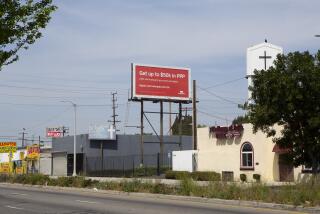O.C. Man Pleads Guilty to a Series of Loan Frauds
- Share via
Douglas P. Blankenship, a Capistrano Beach man accused of posing as a wealthy developer to falsely secure $25 million in loans from banks and businesses across the country, has pleaded guilty in Seattle federal court to racketeering.
Blankenship used aliases, corporate fronts, phony tax returns and false financial statements to mastermind a massive scam against financial institutions in seven states, officials allege. He was indicted last November along with 14 associates, including five Orange County residents.
All but two have pleaded guilty to one or more charges during the last two months.
Blankenship, sometimes known as John Perkins, Kenneth Stall, Randall Sanders and Kenneth Sliz, faces a maximum 20-year prison term and could be ordered to pay $18 million in fines and $17.7 million in restitution. More than $7 million in additional restitution is being sought from some of Blankenship’s associates.
Blankenship is being held in a jail near Tacoma, Wash., in lieu of $1-million bail. His attorney could not be reached for comment Wednesday.
Sentencing is scheduled for Sept. 6 in Seattle.
Blankenship, 47, claimed at different times during the scheme that he was one of the nation’s largest real estate developers, a genius with a doctorate degree in transportation systems and a wealthy coal baron from the mountains of Kentucky, prosecutors have said. His claims were fabricated, although his father was a poor miner in Kentucky, they added.
Blankenship was arrested last November as he parked a gold Rolls-Royce in his driveway.
Besides banks in Washington state, some of Blankenship’s victims included FHP International Corp., Orange Coast Title Co. and Allstate Life Insurance. Allstate sued to force a foreclosure on Blankenship’s Capistrano Beach home in which the insurer’s investigators found 20 handmade silk suits.
Irvine attorney Robert L. Green, who represented Orange Coast and Allstate in two of more than 50 civil lawsuits filed against Blankenship, said Wednesday that he was pleased with Blankenship’s plea.
“I am particularly encouraged by the $17-million restitution,” Green said. “I encountered many individuals--his next door neighbors and small-business people--who were hurt by his fraud.”
Larry Frankhouser, a former top assistant to Blankenship, pleaded guilty to racketeering and is facing 20 years in jail, $24.1 million in fines and $12 million in restitution. Stephanie Blankenship, Douglas Blankenship’s common-law wife, pleaded guilty to one count of making false statements. She faces up to two years in jail plus a $250,000 fine and $4.6 million in restitution.
The Blankenship operation allegedly used dummy corporations, including Pacific Coast National Development Corp., Pacific Coast Plaza, B.B. Steamers and Ortega Professional Plaza--all of San Clemente--to fraudulently obtain tens of millions of dollars in bank loans.
The scheme worked this way, according to prosecutors: A Blankenship company would apply for a big loan, offering as collateral the title on Blankenship’s home or a nearby office complex he owned. After the loan was made, the titles were transferred to a different Blankenship entity and another loan was sought from a different bank or thrift.
When the lender tried to collect on a delinquent loan, the Blankenship entity to whom the loan was made would file for Chapter 11 bankruptcy protection from creditors, preventing any kind of foreclosure.
Some of Blankenship’s victims described him as unusually knowledgeable about banking procedures and the Orange County real estate market, adding that he could cite local building-vacancy statistics off the top of his head.
Blankenship told some investors that he had built more than $460 million in real estate investments nationwide, including 12 commercial strip centers, nine office buildings, nearly 3,000 condominiums and a mall. None of it, prosecutors said, was true.
What’s more, Blankenship distributed financial documents indicating that he had a personal net worth of $99 million, but he later filed for bankruptcy, claiming only $7,600 in assets. Some of the 15 defendants in the Seattle case are accountants who are alleged to have helped him prepare those documents.
Grubb & Ellis, a real estate brokerage, nearly became involved with Blankenship’s operation, but an alert agent noticed that the initials monogrammed on his dress shirt--D.P.B.--didn’t match the name he was using, John Perkins. The brokerage stopped negotiations.
The Blankenship case was prosecuted in Washington state because the scheme’s largest victim --Puget Sound National Bank--is headquartered there. The bank loaned Blankenship $4.5 million but has recently recovered all but $1 million.
Blankenship entered his guilty plea at the end of March, but federal prosecutors in Seattle made no public statement because they are still negotiating with two remaining defendants.
“The pleas have been coming along in a more or less continuous but sporadic fashion,” Assistant U.S. Atty. Bob Westinghouse said.
More to Read
Sign up for Essential California
The most important California stories and recommendations in your inbox every morning.
You may occasionally receive promotional content from the Los Angeles Times.













